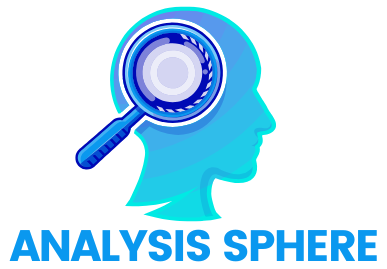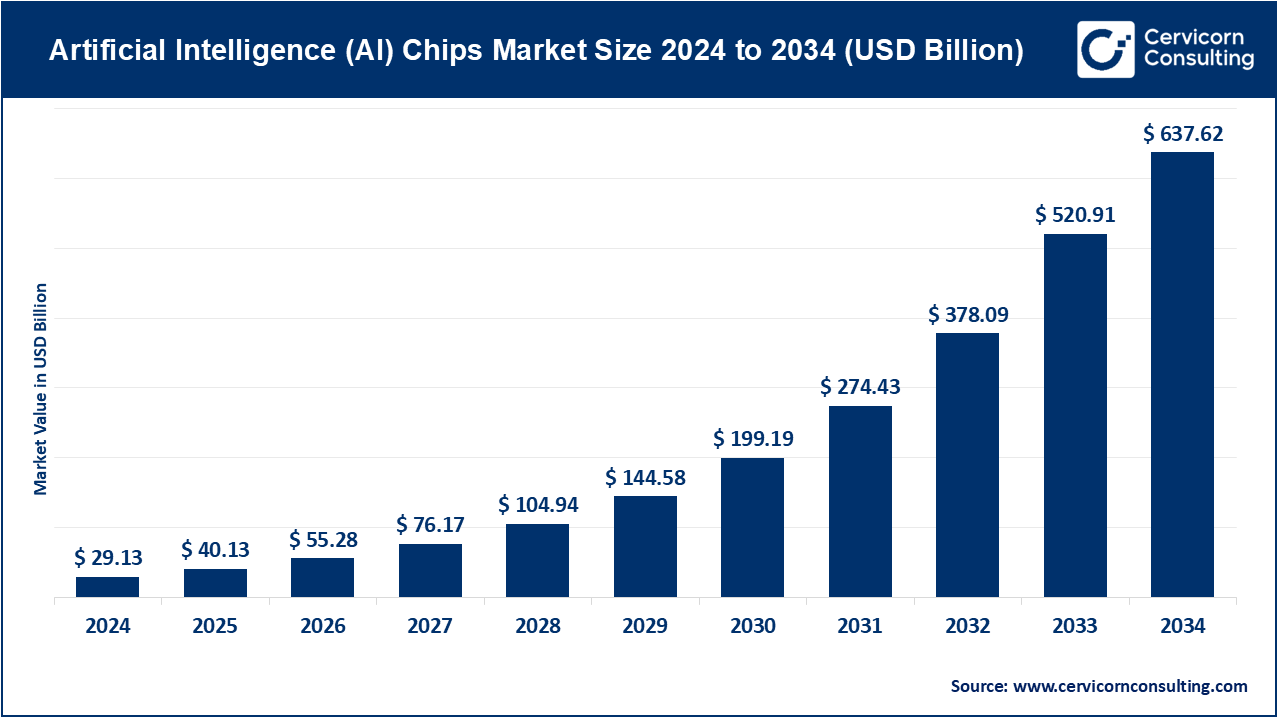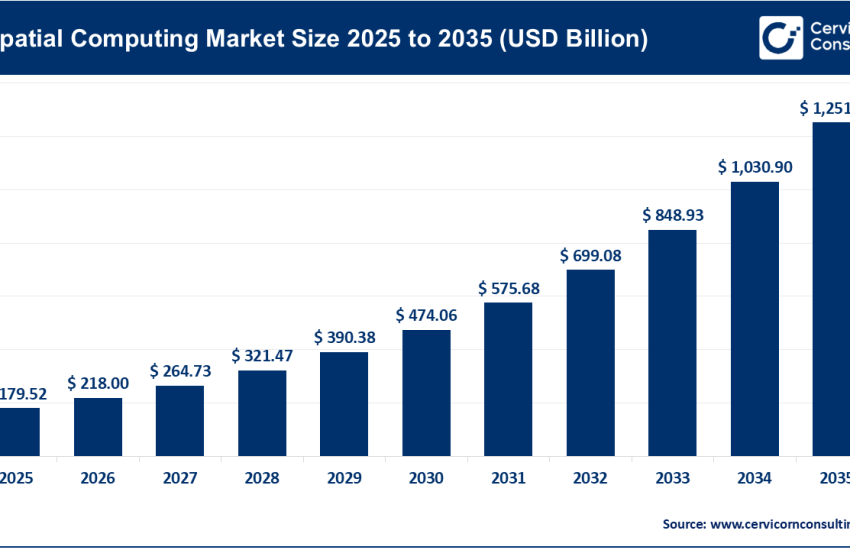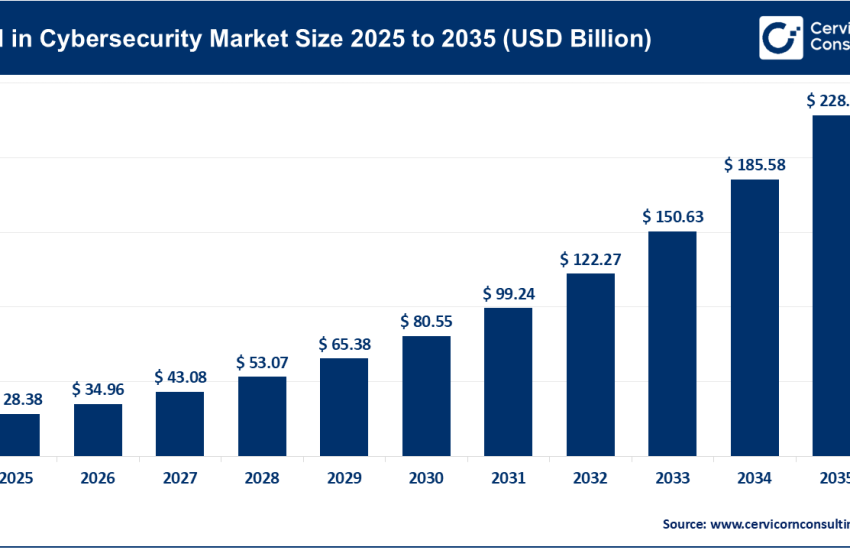Artificial Intelligence (AI) Chips Market Growth, Trends, and Key Players 2025-2034
The artificial intelligence (AI) chips market is one of the most rapidly growing segments within the global semiconductor industry, driven by the ever-expanding use of artificial intelligence technologies across a range of industries. These AI chips are specialized processors designed to handle the vast amounts of data required for AI applications, including machine learning, neural networks, and deep learning. With the increasing adoption of AI across industries such as healthcare, automotive, finance, and telecommunications, the demand for AI chips is growing exponentially. Market growth is fueled by factors such as the need for faster processing speeds, the proliferation of big data, advancements in cloud computing, and the rise of autonomous systems.
Furthermore, governments and businesses are investing heavily in AI research and development, making AI chips a critical element in the AI ecosystem. The emergence of edge computing and the increased adoption of AI in consumer electronics are also contributing to the market’s expansion. As AI technologies continue to evolve, AI chips are becoming more sophisticated, and their applications are expected to grow even further.
What is the Artificial Intelligence (AI) Chips Market?
The Artificial Intelligence (AI) Chips Market refers to the sector of the semiconductor industry that focuses on the development and production of processors specifically designed to accelerate and optimize AI computations. These chips are essential for running AI algorithms, neural networks, and machine learning models, which require substantial computational power. Unlike traditional processors, AI chips are engineered to efficiently process massive datasets and perform the complex mathematical calculations required for AI tasks, such as pattern recognition, predictive analytics, and natural language processing.
The AI chips market encompasses a variety of chip types, including Graphics Processing Units (GPUs), Application-Specific Integrated Circuits (ASICs), and Field Programmable Gate Arrays (FPGAs), each optimized for different AI workloads. The demand for these chips is growing across industries due to the increasing integration of AI technologies in business processes, product development, and consumer applications.
Why is the Artificial Intelligence (AI) Chips Market Important?
The importance of the Artificial Intelligence (AI) Chips Market cannot be overstated, as these chips are the foundation upon which AI-driven innovation is built. AI technologies are transforming industries by enabling systems to perform tasks that traditionally required human intelligence, such as visual recognition, decision-making, and language understanding. AI chips provide the computational power necessary to process complex AI models, handle big data, and improve the efficiency of machine learning systems.
These chips also enable real-time decision-making and enhanced performance, which are crucial for applications in autonomous vehicles, healthcare diagnostics, financial services, and cloud computing. With businesses and governments investing in AI across various domains, AI chips are central to achieving advancements in AI research, applications, and scalability. The growth of edge computing, where AI processing occurs locally on devices rather than in centralized data centers, further elevates the role of AI chips in enabling real-time AI capabilities in IoT devices, robotics, and autonomous systems.
Get a Free Sample: https://www.cervicornconsulting.com/sample/2325
Top Companies in the Artificial Intelligence (AI) Chips Market
- NVIDIA Corporation
- Specialization: NVIDIA specializes in the design and manufacture of GPUs, which are widely used for AI and machine learning tasks due to their parallel processing capabilities. NVIDIA’s GPUs, particularly the Tesla and A100 series, have become the go-to solution for AI model training and inference.
- Key Focus Areas: AI for autonomous vehicles, AI data centers, healthcare, and cloud computing.
- Notable Features: NVIDIA’s hardware solutions, such as the DGX A100 and its Tensor Cores, are designed to accelerate AI workloads.
- 2023 Revenue (approx.): $35 billion (estimated).
- Market Share (approx.): 25% in AI chip market.
- Global Presence: NVIDIA is a global leader in AI chips, with a strong presence in North America, Europe, and Asia-Pacific, particularly in AI research, gaming, and automotive sectors.
- Intel Corporation
- Specialization: Intel is one of the leading manufacturers of microprocessors and AI chips. Its portfolio includes CPUs, FPGAs, and its custom AI chips like the Nervana Neural Network Processor (NNP) and Movidius vision processing units.
- Key Focus Areas: Data centers, autonomous systems, AI for edge devices, and cloud-based AI solutions.
- Notable Features: Intel’s AI chips are optimized for high-performance computing and deep learning applications, with a particular focus on energy efficiency.
- 2023 Revenue (approx.): $65 billion (estimated).
- Market Share (approx.): 15% in AI chip market.
- Global Presence: Intel has a significant market presence globally, particularly in North America and Europe, and is heavily involved in AI development through collaborations with cloud and technology providers.
- Advanced Micro Devices, Inc. (AMD)
- Specialization: AMD is known for its high-performance CPUs and GPUs, including the Ryzen and Radeon series, which are increasingly used in AI applications.
- Key Focus Areas: Gaming, data centers, and AI workloads in both consumer electronics and enterprise solutions.
- Notable Features: AMD’s GPUs, including the Radeon Instinct and MI series, are used for AI processing and machine learning tasks.
- 2023 Revenue (approx.): $26 billion (estimated).
- Market Share (approx.): 10% in AI chip market.
- Global Presence: AMD has a strong global presence, especially in gaming and data center markets, and is a key player in driving AI processing power.
- Qualcomm Technologies, Inc.
- Specialization: Qualcomm designs chips primarily for mobile devices and IoT but is also a key player in AI with its AI-optimized Snapdragon processors used in smartphones and automotive applications.
- Key Focus Areas: Mobile AI, edge computing, and automotive AI solutions.
- Notable Features: Qualcomm’s AI Engine and Snapdragon series are optimized for real-time AI processing in mobile devices and IoT.
- 2023 Revenue (approx.): $45 billion (estimated).
- Market Share (approx.): 8% in AI chip market.
- Global Presence: Qualcomm has a strong presence globally, particularly in the mobile and automotive sectors, and continues to expand in AI-driven edge computing applications.
- IBM Corporation
- Specialization: IBM offers specialized AI processors through its Power9 CPUs, FPGAs, and the IBM Watson AI platform, which helps businesses integrate AI into their operations.
- Key Focus Areas: Cloud AI, enterprise AI, and AI-driven automation.
- Notable Features: IBM’s AI chips focus on accelerating AI workloads in enterprise environments and provide robust integration with IBM’s cognitive computing solutions.
- 2023 Revenue (approx.): $60 billion (estimated).
- Market Share (approx.): 6% in AI chip market.
- Global Presence: IBM has a significant presence in North America, Europe, and Asia-Pacific, particularly in cloud services and enterprise AI applications.
Leading Trends in the Artificial Intelligence (AI) Chips Market
The AI Chips Market is being shaped by several leading trends that are influencing both the technological developments and the way AI chips are integrated into applications. Key trends include:
- Edge AI: With the rise of IoT devices, the focus is shifting towards edge computing, where AI processing happens locally on devices rather than in centralized data centers. This trend reduces latency and enables real-time AI decision-making, especially in autonomous vehicles, healthcare, and industrial automation.
- AI-optimized Hardware: AI workloads require specialized hardware, and companies are increasingly designing chips that are specifically optimized for AI tasks. For example, NVIDIA’s GPUs are designed to handle parallel computing, which is essential for training deep learning models, while companies like Intel and AMD are focusing on hybrid architectures that combine AI processing with traditional computing.
- Integration with 5G: The advent of 5G networks is creating new opportunities for AI chips, as faster data speeds and lower latency enable the processing of large datasets in real time. This integration is particularly important for applications in autonomous vehicles, smart cities, and industrial automation.
- AI in Consumer Electronics: As AI becomes more embedded in consumer electronics, such as smartphones, smart speakers, and wearables, companies are designing more compact and power-efficient AI chips to meet the demands of mobile and edge devices.
- Quantum Computing: Quantum computing, though still in its early stages, has the potential to revolutionize AI by enabling computations that are currently not possible with classical computing. Companies like IBM are making significant strides in this area, which could lead to the development of AI chips that are capable of running quantum algorithms.
Successful Examples of AI Chips Around the World
Several successful applications of AI chips have been implemented around the world, demonstrating their vast potential. For instance, NVIDIA’s GPUs power AI research and applications globally, from healthcare diagnostics to autonomous driving. In healthcare, AI chips are being used to accelerate the processing of medical images, enabling faster diagnoses. In the automotive industry, AI chips are central to the development of self-driving cars, with companies like Tesla using AI to power their autopilot systems. Additionally, AI chips are being used in cloud computing services, where companies like Amazon, Google, and Microsoft are leveraging AI to optimize their data centers and deliver AI-driven solutions to businesses worldwide.
Artificial Intelligence (AI) Chips Market Regional Analysis
North America: North America is the largest market for AI chips, driven by major players like NVIDIA, Intel, and IBM. The region has a robust AI research ecosystem, with significant investments from both government and private sector players. The U.S. government has been heavily involved in AI research, with initiatives like the National AI Initiative Act, which is shaping the development of AI technologies, including AI chips.
Asia-Pacific: Asia-Pacific is expected to see rapid growth in the AI chips market due to the presence of major semiconductor manufacturing hubs like China, South Korea, and Japan. The region is also seeing increasing investments in AI applications in industries such as automotive, healthcare, and consumer electronics. Governments in China and Japan have launched national AI strategies to enhance the development and deployment of AI technologies.
Europe: Europe is focusing on building a competitive AI industry, with the European Union investing in AI research and creating regulations to foster AI adoption. The EU’s “Digital Europe Programme” is funding AI-related research and development, including the development of AI chips for various industries.
Latin America and Middle East & Africa: While these regions are still in the early stages of AI chip adoption, the potential for growth is significant. Governments are beginning to invest in AI initiatives, particularly in industries such as agriculture, healthcare, and energy. These regions are expected to witness increased demand for AI chips as AI technologies become more integrated into various sectors.
To Get Detailed Overview, Contact Us: https://www.cervicornconsulting.com/contact-us
Read Report: Quantum Dot Solar Cells Market Growth & Future Trends (2024-2033)



